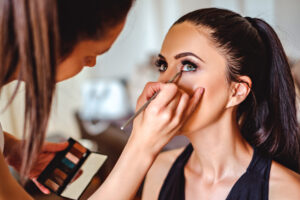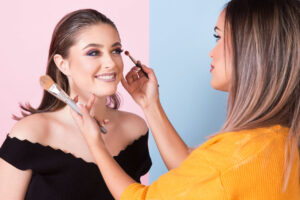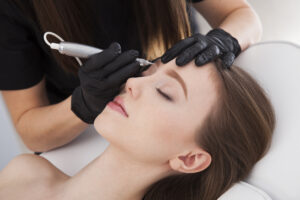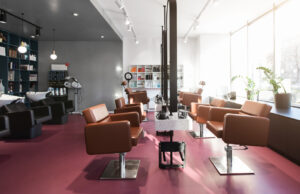Are you someone who loves everything about makeup? Is your biggest dream to become a self-employed makeup artist? If so, this article is exactly what you need!
From qualifications and skills you need and setting your prices to legal issues and ways to promote your business – find out everything you need to know before starting your own business!

Qualifications and skills needed to be a makeup artist
To become a makeup artist, there are no legal requirements to hold a specific qualification. However, you must be able to demonstrate an in-depth knowledge of makeup application techniques, have a keen interest in current trends and new products as well as be creative and have interpersonal skills.
You should also consider investing in regular training to improve your skills and stay up to date with all the latest news and inventions in the industry. To do so, you can attend industry events and exhibitions, follow the news from the biggest makeup brands and read relevant magazines or online journals. You can also follow other artists for inspiration.
When it comes to running a business, there are some general business and enterprise skills you need to have or learn. These are a few examples:
Administration and time management
Once you start your own business, you aren’t only responsible for creating makeup looks, you also need to take and manage bookings. You can choose whether you want people to ring you or use online appointment booking apps. Depending on that, you might need to improve your communication skills, so you sound professional and welcoming when speaking on the phone, or you might need to spend some time learning how to use new software, so you don’t miss any appointments.
Time management is also very important as you need to make sure you don’t accept more bookings than you can physically handle. You need to create a strict schedule that would allow you to perform your best as well as have breaks in between appointments to tidy up, sanitise your tools and have some time for yourself. You also need to make sure you have enough time to get to another place if you provide services at your clients’ homes or different venues.
Bookkeeping
Another important skill to have is bookkeeping. As a makeup artist, you spend money on products and equipment. If you’re renting a chair at a salon, you also need to pay rent. If you travel to clients’ homes or different events, you spend money on travelling. On top of that, you also receive payments. You need to make sure that you record all the costs and income as well as keep the receipts.
Marketing
No matter how good you are at what you do, you also need to make sure people can find you. Think about why people should choose you instead of any other makeup artist. Do you use some new techniques? Do you have years of experience? Shout about those things that make you different! Of course, marketing is way more than that but knowing your unique selling point is essential.
If you feel like you don’t have the skills you need to start your own business, we can help you with that! Here at EMS we offer one-on-one support with experienced business advisors as well as workshops for those making their first steps into self-employment.
Why should you start a business as a makeup artist?

You can make people happy and confident
For some people, getting their makeup done can cause many positive emotions. It boosts their confidence and brings a smile to their faces. And the best part – you are the reason they feel that way!
You also get a chance to be a part of peoples’ best moments and special occasions such as birthdays or weddings as well as help them relax or cheer up when they’re going through something difficult.
When you’re a makeup artist, your days are never the same
While you have your regular customers, you also get to meet new people every day! Also, different customers want different makeup looks, so your days are never the same.
It allows you to be creative
If you’re a creative person and are looking for a career that would allow you to express your creativity, being a makeup artist could be the right choice. While some people prefer simple, natural looks, others want something more glam or something extraordinary. Some clients might even come in without knowing what they want, so you get a chance to surprise them! And if you work with magazines or in the TV industry, you’ll get an opportunity to do some super creative looks!
How much should you charge as a makeup artist?
 The prices you charge depend on many different factors. Different looks require a different amount of time and different products. Your experience and local competition also influence the price. Some makeup artists offer discounts and loyalty schemes to reward their regular customers. However, it’s important to remember that even if you offer some type of discount, the final price still needs to cover all the costs as well as make a profit.
The prices you charge depend on many different factors. Different looks require a different amount of time and different products. Your experience and local competition also influence the price. Some makeup artists offer discounts and loyalty schemes to reward their regular customers. However, it’s important to remember that even if you offer some type of discount, the final price still needs to cover all the costs as well as make a profit.
Just to give you a few examples, the average price for bridal makeup trial + application is around £170, from £50 to £120 for a special occasion, such as prom or a theme party makeup and at least £40 for a one-to-one hour-long makeup lesson.
According to BECTU, the media and entertainment union, if you work in the film industry, you can earn around £120 to £605 for a ten-hour day and if you work at London Fashion Week, you can expect from around £75 to £450.
Get the ulimate guide to start a business

Legal issues
Setting up and running a business as a makeup artist also comes with trading, commercial and legal issues:
Licensing of permanent and semi-permanent make-up services
 Providing treatments such as permanent or semi-permanent makeup has a great risk of infection as it involves piercing the skin. That’s why it’s regulated by local authority licensing departments.
Providing treatments such as permanent or semi-permanent makeup has a great risk of infection as it involves piercing the skin. That’s why it’s regulated by local authority licensing departments.
When it comes to getting a licence, the system and fees vary depending on local authorities and can cost up to £1,800. To get the licence, you might be required to complete certain courses and update your training regularly. Once you get your licence, local authority environmental health officers will carry out inspections of the premises to make sure that permanent or semi-permanent makeup services are provided safely and hygienically.
Regulation of cosmetic products
As a makeup artist, you’re responsible for choosing the cosmetic products you use. All of those products must comply with the Cosmetic Products Enforcement Regulations 2013. You must make sure that the products you use are safe for your clients’ health, don’t contain specified ingredients and haven’t been tested on animals. For more information about the regulations, read here.
Initial consultations
To avoid any health risks, it’s best if you ask your clients to fill in medical questionnaires before providing your services. This will provide you with important details such as existing skin conditions or recent illnesses, medications or allergies that your client has and will help you decide whether you can provide your services safely. You should also require clients to undergo a patch test, to see if products don’t cause an allergic reaction.
Renting space in a salon
 To work as a self-employed makeup artist, you don’t need to open your own salon, work from home or travel to your clients’ homes. You can choose to rent a chair in an existing salon.
To work as a self-employed makeup artist, you don’t need to open your own salon, work from home or travel to your clients’ homes. You can choose to rent a chair in an existing salon.
When it comes to a rental agreement with the premises owner or landlord, it must include details such as the duration of the agreement, rental fee, resources and equipment provided at the premises, the makeup artist’s liability for loss or damage, details of the owner or landlord’s public liability insurance cover and termination of the agreement.
Running your makeup artist business from home
If you decide to run your business from home, you must contact your mortgage provider or landlord to check whether you’re legally allowed to do so.
You also need to be aware of the business rates and have adequate insurance cover both for the home and for business purposes.
Privacy and data protection
Under the Data Protection Act 2018 and the General Protection Regulation (GDPR), any personal information that you collect about your clients must be stored securely and used only for the purpose it was collected. You also need to have a data protection policy and notice that explains how you collect, hold, manage and use the personal data of your clients.
Music licensing
If you want to play some background musing during your appointments, you must hold TheMusicLicence from PPL PRS Ltd. If you rent a room in a salon, you must make sure that the owner of the salon also holds the licence. You can find more information here.
Get the ulimate guide to start a business

Promoting your makeup artist business
Use social media
People love seeing examples of makeup artists’ work before deciding whether they want to use their services. Using the right social media platforms and sharing good quality content can make your business very successful. To increase engagement, consider sharing different types of content. While pictures or videos of your work can attract new customers, sharing content such as reviews on new products or makeup tips, shows your knowledge, builds trust and make your existing customers feel better about using your services.
Get reviews
Reviews are a great way to show your potential customers that your business is credible as you present them with the thoughts of those who already tried it. So make sure your customers write those reviews! Encourage your happy customers to write a review or share a picture on their social media. If you’re just starting and don’t have many customers yet, you can read the article here to find out how you can get more reviews!
Register with an online appointment booking services
These days, people prefer booking their appointments online. It lets them do it at any time of the day and see the availability straight away. Also, registering with online booking platforms such as Treatwell increases your chances of attracting new clients. If someone goes on the app to book an appointment, they might discover your business. They can also see your prices, availability, read reviews and book appointments without even contacting you!
Disadvantages of being a makeup artist
Clients can be difficult
While you meet some amazing people and might even make new friends, some clients can be… not that pleasant to work with. Complaining about every single thing or simply being rude, some people can really ruin your mood or the whole day. So it’s important you know how to deal with people like this and not take everything personally.
Many people cancel their appointments
 The beauty industry is probably the one with the most cancelled appointments. Some people cancel only a few minutes before or don’t turn up without any notice, which means you can’t find another customer for that time slot. This creates a risk of not making enough money to make a profit. To avoid situations like this, try to think of other ways to minimise the risk of cancelled appointments. A great option is to charge upfront – either a full amount or a deposit. Give your clients an option to cancel, for example, up to 12 hours before to get a full refund. If they don’t cancel by that time, even if you can’t fill in the place, you still get the money.
The beauty industry is probably the one with the most cancelled appointments. Some people cancel only a few minutes before or don’t turn up without any notice, which means you can’t find another customer for that time slot. This creates a risk of not making enough money to make a profit. To avoid situations like this, try to think of other ways to minimise the risk of cancelled appointments. A great option is to charge upfront – either a full amount or a deposit. Give your clients an option to cancel, for example, up to 12 hours before to get a full refund. If they don’t cancel by that time, even if you can’t fill in the place, you still get the money.
You need to do all the other, not so fun business stuff yourself
When you’re an employee you don’t need to worry about paying tax, doing monthly bookkeeping or doing everything you can to promote your business. When you run your own business, you need to spend extra time sorting these things out for yourself.
Now that you know what you need to become a makeup artist and the pros and cons of being one, you can decide whether it’s something you want to do. If you need any help and support setting up, we’re here to help!
Get the ulimate guide to start a business


